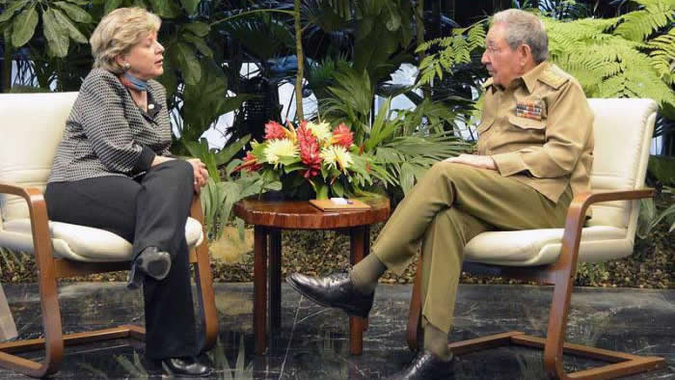ECLAC’s Executive Secretary Concludes Visit to Cuba
Topic(s)
Alicia Bárcena met with the President of Cuba’s Council of State, Raúl Castro, and gave a keynote lecture at the University of Havana.

(October 30, 2014) The Executive Secretary of the Economic Commission for Latin America and the Caribbean (ECLAC), Alicia Bárcena, concluded on Tuesday, October 28 a two-day visit to Cuba, where she met with the President of the Council of State and the Council of Ministers, Raúl Castro, as well as other high-level authorities from that country. She also gave a keynote lecture at the University of Havana.
The senior ECLAC official was welcomed by the President, with whom she discussed the common will to deepen cooperation between the United Nations regional organization and Cuba’s Government. The meeting was attended by the Vice President of the Council of Ministers and Economy and Planning Minister, Marino Murillo, and the Minister of Foreign Trade and Foreign Investment, Rodrigo Malmierca.
At the start of her visit to the Caribbean country, Alicia Bárcena met on Monday, October 27 with the First Vice President of the Councils of State and of Ministers, Miguel Díaz-Canel Bermúdez. The Executive Secretary also held a meeting with the Vice Minister for Foreign Affairs, Abelardo Moreno. She shared with the authorities the importance of the United States ending its embargo against Cuba, which has been in effect for the last 52 years with huge economic, political and social costs.
At these gatherings, ECLAC’s most senior representative praised Cuba’s decision to send a team of 461 doctors and nurses to Sierra Leone, Guinea and Liberia to help fight Ebola, in response to a call made by United Nations Secretary-General Ban Ki-moon to battle that epidemic in West Africa.
Alicia Bárcena also met with representatives of the United Nations System accredited in Cuba and signed a cooperation agreement between ECLAC and the United Nations Development Program (UNDP) to support Cuba’s National Statistics and Information Office (ONEI).
During her keynote lecture at the University of Havana, where she was welcomed on Tuesday by the rector, Gustavo Cobreiro, the Executive Secretary presented the so-called Equality Trilogy, which includes the last three position documents that ECLAC has released since 2010 whose central themes are equality, structural change and social compacts, respectively.
Speaking before diplomats, academics and students from that university, Alicia Bárcena stressed that Latin America and the Caribbean suffers from external vulnerabilities in the economic arena, high structural heterogeneity in terms of production, and state weakness in the institutional dimension. These factors represent significant obstacles for reducing the inequality that affects the region.
Therefore, ECLAC proposes that countries forge compacts involving the market, state and society to give legitimacy to structural reforms in areas such as taxation, the labor market, the governance of natural resources, and consumption and environmental sustainability. These reforms should be focused on achieving greater equality for all, the Executive Secretary concluded.
More information on www.cepal.org.
Related link(s)
Country(ies)
-
Cuba